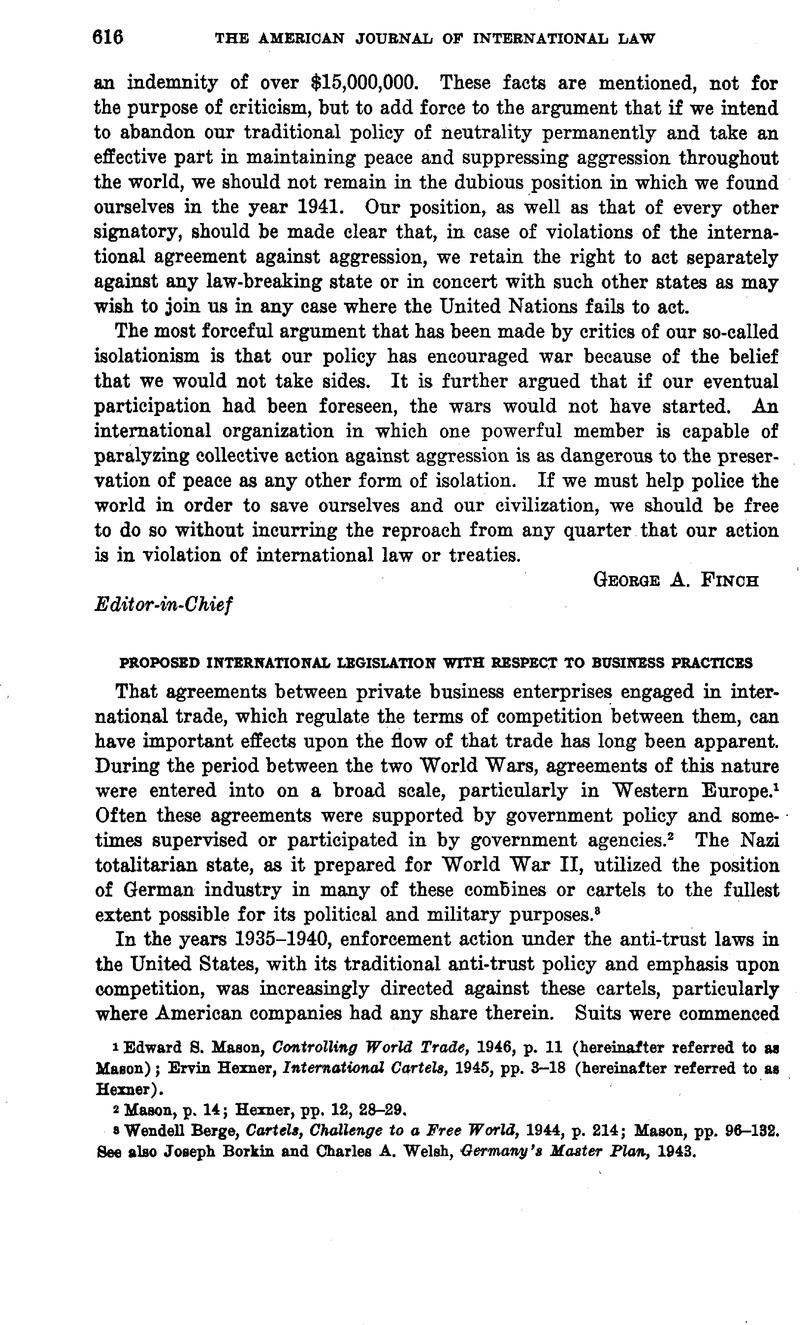Published online by Cambridge University Press: 20 April 2017

1 Mason, Edward S., Controlling World Trade, 1946, p. 11 (hereinafter referred to as Mason)Google Scholar; Hexner, Ervin, International Cartels, 1945, pp. 3–18 (hereinafter referred to as Hexner)Google Scholar.
2 Mason, p. 14; Hexner, pp. 12, 28–29.
3 Berge, Wendell, Cartels, Challenge to a Free World, 1944, p. 214 Google Scholar; Mason, AA, pp. 96–132. See also Borkin, Joseph and Welsh, Charles A., Germany’s Master Plan, 1943.Google Scholar
4 American Banana Company v. United Fruit Company, 213 U.S. 347 (1909).
5 United States v. Aluminum Company of America, 148 P. 2d 416 (1945); United States v. National Lead Company, 63 F. Supp. 513 (1945).
6 Annual Reports of the Attorney General of the United States, 1941–1944. A typical statement of this policy is found in the 1944 Report, p. 19:
The enforcement of the Anti-trust Law during the fiscal year has been directed at those strategic points in the economy where the removal of restraints and monopolistic conditions would have the greatest effect in aiding war production and in preserving for the post-war period the opportunity for free and competitive enterprise.
7 In a letter of September 6, 1944, to Secretary of State Hull, President Roosevelt said in part:
During the past half century the United States has developed a tradition in opposition to private monopolies. … This policy goes hand in glove with the liberal principles of international trade for which you have stood through many years of public service. … Unfortunately a number of foreign countries, particularly in continental Europe, do not possess such a tradition against cartels. … I hope that you will keep your eye on this whole subject of international cartels because we are approaching the time when discussions will almost certainly arise between us and other nations. Department of State Bulletin, Vol. 12, p. 254.
To this letter Secretary Hull replied on September 11, 1944:
I shall continue to follow closely the progress of this work on the subject of international cartels, … in the near future, and consistent with the pressing demands of the war upon your time, I want to present to you in more detail plans for discussion with other United Nations in respect to the whole subject of commercial policy. Same, p. 292.
8 The United States Proposals for Expansion of World Trade and Employment were originally announced in connection with the public announcement of the British Loan Agreement on December 6, 1945 (Department of State Bulletin, Vol. 13, p. 913; Pub. 2411, Commercial Policy Series 79, 1945).
9 Chapter IV.
10 Chapter IV of The Proposals became Chapter V of the Suggested Charter for an International Trade Organization (Pub. 2598, Commercial Policy Series 93, September 1946), which, after the preliminary conference in London between October 15 and November 26, 1946, became Chapter VI of the Revised Charter for an International Trade Organization (Department of State, December, 1946). The official text of the Charter as revised will be found as the appendix to the “Report of the First Session of the Preparatory Committee of the United Nations Conference on Trade and Employment,” London, October, 1946, U.N. Document E/PC/T/33.
11 The other country whose economic thinking is most closely represented in this chapter of the Charter is Canada. For a discussion of Canadian Statutes and cases in this field see Harry A. Toulmin, Jr., International Contracts and the Anti-Trust Laws, 1947, Chapter V.
12 The practices referred to are:
(a) fixing prices or terms or conditions to be observed in dealing with others in the purchase, sale or lease of any product;
(b) excluding enterprises from any territorial market or field of business activity, allocating or dividing any territorial markets or fields of business activity, allocating customers, or fixing sales or purchase quotas;
(c) boycotting or discriminating against particular enterprises;
(d) limiting production or fixing production quotas;
(e) suppressing technology or invention, whether patented or unpatented;
(f) extending the use of rights under patents, trade marks or copyrights to matters not properly within the scope, or to products or conditions of production, use or sale which are not the immediate subjects, of the authorized grant. Revised Charter for An International Trade Organization, Chapter VI, Article 39, 3.
In the prior Suggested Charter, there was a presumption that these practices had such harmful effect, and member nations agreed not merely to investigate, but to take corrective action.
13 This Chapter of the Charter was extensively revised by the Preparatory Committee at its meeting in London, and now represents a compromise between conflicting points of view. The effect of this revision has been to reduce considerably the rigidity of prohibitions contained in previous drafts and also to curtail certain powers originally given to the proposed International Trade Organization.
14 The United States Tariff Commission published, in March, 1947, a document of 149 pages which analyzes the Charter provisions and comments on them. This commentary indicates the various ways in which the statutes of the United States would have to be amended to bring them into conformity with the Charter.
15 Prior to the London meeting, member nations were obligated to “Take action, after recommendation by the Organization, to terminate and prevent the recurrence of a particular restrictive business practice or a group of practices. …” Suggested Charter, Article 37 (5). Now, members are only obligated “to take the fullest account” of such recommendations. Revised Charter, Article 42, 1 (b).
16 Prior to the London Meeting the Organization did not have to await complaints from member nations but had power to call general consultative conferences on its own initiative. Suggested Charter, Article 36.